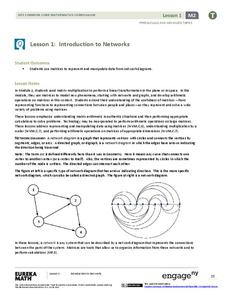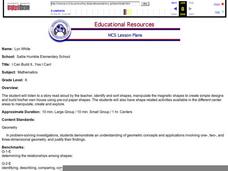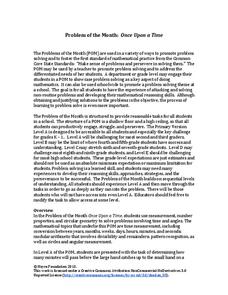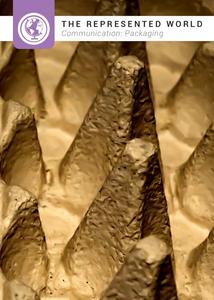Virginia Department of Education
Pythagorean Theorem
Investigate the meaning of the Pythagorean Theorem through modeling. After comparing the area of the square of each side, individuals cut triangles and squares to facilitate the comparison.
EngageNY
Introduction to Networks
Watch as matrices break networks down into rows and columns! Individuals learn how a network can be represented as a matrix. They also identify the notation of matrices.
EngageNY
An Area Formula for Triangles
Use a triangle area formula that works when the height is unknown. The eighth installment in a 16-part series on trigonometry revisits the trigonometric triangle area formula that previously was shown to work with the acute triangles....
EngageNY
Informal Proof of AA Criterion for Similarity
What does it take to show two triangles are similar? The 11th segment in a series of 16 introduces the AA Criterion for Similarity. A discussion provides an informal proof of the theorem. Exercises and problems require scholars to apply...
Noyce Foundation
Time to Get Clean
It's assessment time! Determine your young mathematicians' understanding of elapsed time with this brief, five-question quiz.
Noyce Foundation
Sewing
Sew up your unit on operations with decimals using this assessment task. Young mathematicians use given rules to determine the amount of fabric they need to sew a pair of pants. They must also fill in a partially complete bill for...
Inside Mathematics
Marble Game
Pupils determine the theoretical probability of winning a game of marbles. Individuals compare the theoretical probability to experimental probability for the same game. They continue on to compare two different probability games.
Inside Mathematics
Archery
Put the better archer in a box. The performance task has pupils compare the performance of two archers using box-and-whisker plots. The resource includes sample responses that are useful in comparing individuals' work to others.
Curated OER
Pattern Block Fractions
Fourth graders participate in a lesson that is about the finding of different fractional sizes with the help of pattern blocks. They define the vocabulary terms of numerator and denominator. The lesson also uses geometry and relates it...
Curated OER
I Can Build It.....Yes I Can!
Kindergartners listen to a story read by their teacher, then use magnetic shape pieces to construct simple designes. They "build" their own house using pre-cut paper shapes. This age-appropriate lesson would be an excellent choice for...
Pennsylvania Department of Education
Build What I've Created
n this geometric lesson plan, students define and identify two dimensional shapes based on their attributes. They complete worksheets based on the geometric concepts.
Noyce Foundation
Once Upon a Time
Examine the relationship between time and geometry. A series of five lessons provides a grade-appropriate problem from elementary through high school. Each problem asks learners to compare the movement of the hands on a clock to an angle...
Indiana Department of Education
The Represented World: Communication—Packaging
Challenge your classes to design and market a new product. Collaborative groups use geometry skills to create packaging for their products. Finally, they plan a marketing strategy to present to a marketing specialist.
Curated OER
Using Cabri Geometry to Create Fractals
Learners construct the Sierpinski Triangle using Cabri Jr. They use a step-by-step guide to construct the Sierpinski Triangle on their graphing calculator and then discuss the formula for constructing a nth stage Sierpinski Triangle.
Curated OER
Tantalizing Tessellations Lesson III: Creating a Slide Translation
Students explore tessellations and the artwork of M.C. Escher. They view and discuss a video about M.C. Escher, create a slide template out of cardboard, and create a poster with their tessellation pattern.
Curated OER
Geometry
Fourth graders explore symmetry and congruent figures. They draw letters of the alphabet that have symmetry, draw congruent figures, draw figures on dot paper, and complete three worksheets.

















